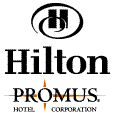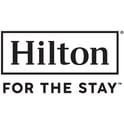Done Deal! - Hilton, Promus Announce Merger Agreement - $ 4 Billion Transaction To Create One Of World's Largest, Most Diverse Lodging Companies

BEVERLY HILLS, Calif. / Sept. 7, 1999 -- Hilton Hotels Corporation
Per the terms of the merger agreement, Hilton will pay $38.50 per share in cash for 55 percent of the Promus shares. The remaining 45 percent of Promus shares will be exchanged for Hilton common stock (collar and exchange ratios described below). Promus shareholders will have the right to elect to be paid in cash or Hilton stock, subject to prorations to reflect the 55 percent cash, 45 percent stock ratios. Total consideration of the transaction, including Promus debt, is approximately $4.0 billion. Upon completion, the merger will create one of the world's largest and most diverse lodging companies and combine under one entity the industry's premier brand names.
The agreement, announced jointly by Stephen F. Bollenbach, president and chief executive officer of Hilton Hotels Corporation and Norman P. Blake, Jr., chairman, president and chief executive officer of Promus Hotel Corporation, has been approved by the Boards of Directors of both companies. Completion of the merger is expected by year-end 1999. Approval of shareholders of both companies is required. It is anticipated that the transaction will be tax-free to Promus shareholders with respect to any Hilton stock received in the merger, but the transaction is not conditioned on such tax-free treatment.
Under terms of the agreement, the stock portion of the transaction has a +/- 5 percent "collar" centered around the average Hilton stock price for the 30 trading days ended September 3 ($12.60). Accordingly, in the event that the average Hilton stock price during the measurement period prior to closing is between $11.97 and $13.23, Promus shareholders who elect stock will receive a number of Hilton shares equal to $38.50 divided by the average Hilton stock price during the measurement period. In the event the average Hilton stock price during a 30-day measurement period immediately prior to closing is less than $11.97, Promus shareholders electing stock would receive 3.2158 shares of Hilton for each Promus share. If the average Hilton stock price is greater than $13.23, the exchange ratio would be fixed at 2.9096 Hilton shares for each Promus share. Hilton has received a commitment from Bank of America N.A., which has fully underwritten amounts sufficient to complete the transaction, including related debt refinancings.
The Hilton-Promus combination will have nearly 1,700 hotels, approximately 290,000 rooms and 85,000 employees, and (based on current analyst estimates and including anticipated year one synergies) pro forma 2000 EBITDA of approximately $1.3 billion. Hilton estimated that the merger will result in annual synergies – operating efficiencies, cost savings and revenue enhancement opportunities – in the $55 million range for the first year, and $90 million thereafter on a run-rate basis. The transaction will be accounted for as a purchase. Based on current analyst estimates, the transaction is expected to be moderately dilutive to Hilton earnings in 2000 due to incremental depreciation and amortization including goodwill. On a cash flow basis (less maintenance capital expenditures), the transaction is expected to be immediately accretive to pro forma cash earnings per share. At year-end 1999, the new company will have approximately $5.4 billion of total pro forma debt (net of the Park Place Entertainment allocated debt of $625 million).
Aided by the anticipated cost savings, increased revenues from management and franchise fees, strategic development and expansion of the combined company's brands and other synergies, Hilton said it expects to achieve annual average EBITDA growth in excess of 10 percent, and diluted EPS growth in excess of 20 percent over the next several years. As a result of the merger, the percentage of Hilton's estimated pro forma 2000 EBITDA generated from management, franchise and service fees is expected to more than double from approximately 13 percent as a stand-alone company to approximately 30 percent.
The new company will bring under one umbrella, and feature a complementary portfolio of, many of the world's best known and most highly regarded hotel brands, including Hilton, Embassy Suites, Hilton Garden Inn hotels, Hampton Inn, Doubletree, Homewood Suites and Red Lion. It will feature a significant presence in virtually every important industry category, from the upscale, mid-priced and limited-service segments to extended stay and vacation ownership.
Among the strategic initiatives and benefits envisioned through the merger:
- Ability to include the Promus brands in Hilton's award-winning HHonors frequent guest program, Hilton Reservations Worldwide, Hilton.com and Hilton Direct.
- Significant economies of scale in such areas as marketing, purchasing, operations and technology.
- Maintenance and growth of Doubletree as a complementary brand to Hilton.
- Blending both companies' extended-stay products.
- Integration of both companies' superior information systems.
- Concentration of regional operations centers to enhance management of the expanded portfolio of owned and managed hotels.
Corporate headquarters will be in Beverly Hills, California, with a significant operational presence being maintained in Memphis, Tennessee.
"This exciting and strategically compelling combination, especially when placed alongside our alliance with Hilton International, creates a global hotel ownership, management and franchising powerhouse with the size, geographic scope, management, respected brands and resources to be a leader in the hospitality industry for decades to come – a future that we are convinced will bring enormous benefits to our respective shareholders, employees, customers, hotel owners and franchisees," Bollenbach said.
"It is a transaction that immediately accomplishes our longstanding objectives of acquiring outstanding hotel assets, leveraging our brands and growing our franchising, management and timeshare businesses. The recognition, esteem and operating performances of Promus' Embassy Suites, Hampton Inn, Doubletree, Homewood Suites and Red Lion brands and the leadership position these brands enjoy in their respective market segments will immediately enhance and strengthen our existing vibrant and growing stream of management and franchise revenues."
Mr. Bollenbach continued: "In an industry where size and scale are important, we are maximizing our ability to achieve operating efficiencies and moving forward with development and acquisition programs to grow the company and create value for our shareholders and bring even more services and destinations and choices to our customers. And in an industry where brand value cannot be overstated, this combination brings together some of the most instantly recognizable, complementary and esteemed brand names to be found anywhere.
"I am particularly pleased to be working on this transaction with Norm Blake, who has been resolute in his desire to bring value to his shareholders, hotel owners and employees, and I look forward to coordinating with him and his team a smooth and effective transition."
Mr. Blake said, "Hilton brings certain attributes which allow Promus to be increasingly more competitive, namely 1) a 'flywheel' brand which provides broad market awareness and consumer equity to complement the Promus brand portfolio; 2) a well established customer loyalty/frequency program to drive property level revenues; 3) extensive distribution and global market access to broaden market reach; 4) timesharing owner/operator expertise to augment Promus' established market position, and 5) a strong national sales force to cross-sell brands and drive group business.
"Combining these complementary strengths with Promus' strong brands and proven franchising and hotel management capabilities created by Promus' outstanding employees represents a significant benefit to all of our stakeholders," he said.
The Hilton system currently includes some 275 owned, managed or franchised hotels in North America with such famous properties as New York's Waldorf-Astoria, Waikiki's Hilton Hawaiian Village and Chicago's Palmer House, as well as the new mid-priced Hilton Garden Inn hotels, Hilton Residential Suites extended-stay hotels and Hilton Grand Vacations timeshare facilities.
Promus Hotel Corporation is the franchisor/operator of the Doubletree Hotels, Doubletree Guest Suites, Embassy Suites, Hampton Inn, Homewood Suites, Hampton Inn & Suites, Doubletree Club, Red Lion Hotels, Embassy Vacation Resort and Hampton Vacation Resort brands. The company also manages non-Promus branded hotels and facilities in its University Hotel & Conference Center division. The company franchises, operates or owns hotels throughout the United States and in Canada, Mexico and Latin America. Promus is headquartered in Memphis, Tennessee and has approximately 40,000 employees.
When added to the hotels owned and/or operated by Hilton Group Plc – the U.K.-based company with which Hilton Hotels Corporation has a global strategic alliance – the new company's worldwide system will include approximately 1,900 hotels with approximately 350,000 rooms in 50 countries around the world.
Morgan Stanley Dean Witter and Donaldson, Lufkin & Jenrette Securities Corporation served as investment advisors to Hilton, and Salomon Smith Barney advised Promus.
This news release contains forward-looking statements with respect to the financial condition, results of operations and business of Hilton and Promus, including estimates as to anticipated revenues, EBITDA, cost savings and total synergies. These forward looking statements are based on plans, estimates and assumptions and are subject to risks and uncertainties that could cause actual results to differ materially from those indicated. Among those risks and uncertainties are the ability of the companies to achieve integration of operating systems, personnel and facilities as quickly and efficiently as planned; greater than anticipated costs of integrating the two organizations; the effect of "change-in-control" clauses in contracts which could lead to termination or renegotiation as the result of the transactions; and the ability of the companies to retain key personnel. Other factors that may cause actual results to differ materially from those contemplated include changes in general economic conditions and in the hotel and travel industries, adverse changes in the costs of borrowings, changes in regulatory requirements and actions of competitors.
Kathy Shepard
310 205-7676
Hilton
